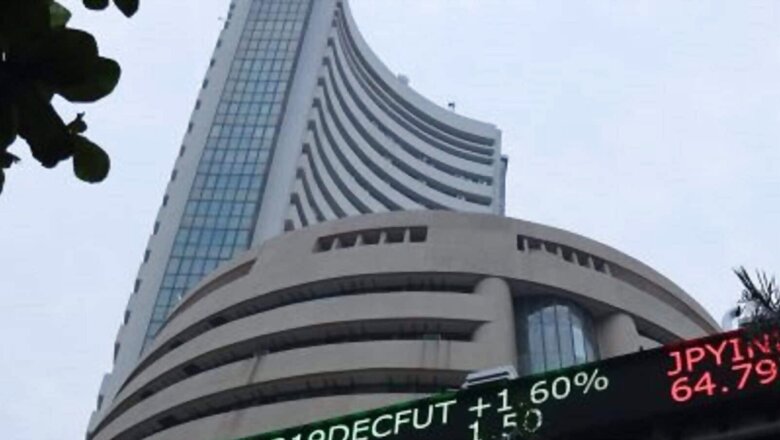
views
Even as domestic investors are concerned about the impact of interest rate hikes by global central banks and global uncertainties on the Indian equity market, experts said it will affect the domestic market to a certain extent but strong retail and institutional participation here can keep the market from having severe impact.
Recently, the US Federal Reserve raised interest rates for the first time since 2018. It also plans to raise the rates several times this year, given prevailing 40-year high inflation of 7.9 per cent in the US in February, propelled by surging costs for gas, food and housing.
ICICI Securities Chief Investment Officer Piyush Garg said, “Given global supply chain shock, the ongoing Russia-Ukraine war, elevated crude oil prices and high inflation rates globally, it is likely that equities may not do well during the US rate hike cycle going forward.”
Currently, Brent crude oil stands at USD 114.36 per barrel.
He, however, added that some stocks, such as information technology and banking, may not feel the heat but the consumption sector can be adversely affected.
The US Fed recently raised the target range for the federal funds rate to 0.25-0.5 per cent and anticipated that ongoing increases in the target range will be appropriate. Last week, its Chair Fed Jerome Powell also said that the central bank will raise the rates “more aggressively” if needed.
According to independent markets analyst Ambareesh Baliga, “Markets may be adversely affected by the US Fed rate hikes to a certain extent going forward as the foreign portfolio investors are pulling their money out of the country to safe-havens in the US but rising retail participation may hold markets from slipping too much.”
Between April and October in 2021, about 1.9 crore demat accounts were opened riding on the good returns during the pandemic.
However, Baliga said markets now do not rely on FPI moneys too much as compared to earlier periods and domestic participation is expected to keep the market in positive.
On Friday, FPI investments witnessed a net outflow of Rs 1,507 crore, whereas the domestic institutional investors put in Rs 1,373 crore into the market on the same day, according to the data available on the BSE website.
In the past three months till March 28, FPIs have withdrawn a net amount of Rs 1,15,272 crore from the Indian markets, according to the latest NSDL data.
Sectors that may not face heat
According to experts, the impact of US Fed rate hike will not be the same across the board in the stock market. Some stocks may do well during the rate hike cycle while others may be affected too much given other external factors.
ICICI Securities’ Garg said, “IT, banking and a section of engineering companies are promising now which investors can look at.”
Sensex IT companies such as Tata Consultancy Services, Infosys and Wipro have given good returns in the range of 20-50 per cent in the past one year, where as the BSE benchmark has risen 16 per cent.
Garg, however, said caveats like non-performing assets (NPA) status and overweight of FPIs in the banking may pose risk.
In the last one year, banking sector underperformed the benchmark and gave mixed returns. Some banking stocks such as government-owned State Bank of India (38 per cent) and private lender ICICI Bank (22 per cent) have given good positive results in one year, whereas Punjab National Bank (- 2.2 per cent) and HDFC Bank (-4.69 per cent) gave negative returns. Axis Bank rose just 4.47 per cent between March 31, 2021, and March 28, 2022.
Baliga said, “Information technology and pharmaceutical companies are expected to do well going forward, while banking can also do good subject to the NPA scenario.”
The persistent fund outflow puts downward pressure on the rupee, which could help export-oriented sectors such as IT and pharma, he said.
Concerns
Among the sectors that may see the most adverse impact of the US Fed rate hike and other external factors are consumption, manufacturing and metal ones.
Baliga said that as the commodity prices are running high due to the global supply shock and uncertainty due to the Russia-Ukraine war, the manufacturing sector may be stressed for the next two quarters. So, investors should carefully choose manufacturing sector shares at least till the Russia-Ukraine war ends.
Garg said consumption sectors may be the most affected during the US rate hike cycle going ahead given other external factors. “It is due to the elevated rate commodity prices globally.”
Rising domestic inflation and anticipated tightening of monetary policy by the RBI to keep inflation under target range 4-6 per cent should also be watched for. Retail inflation in February rose to an eight-month high of 6.07 per cent.
Bottomline
Experts said investors should be careful going forward as per the global uncertainty due to elevated crude oil prices, COVID-19 situation and the Russia-Ukraine war but the impact will not be equal across sector and some industries may do well.
If retail investors have made good money on their investments, they may now also consider booking profits and enter market after some time when the uncertainty subsides, Baliga said.
Read all the Latest Business News and Breaking News here



















Comments
0 comment